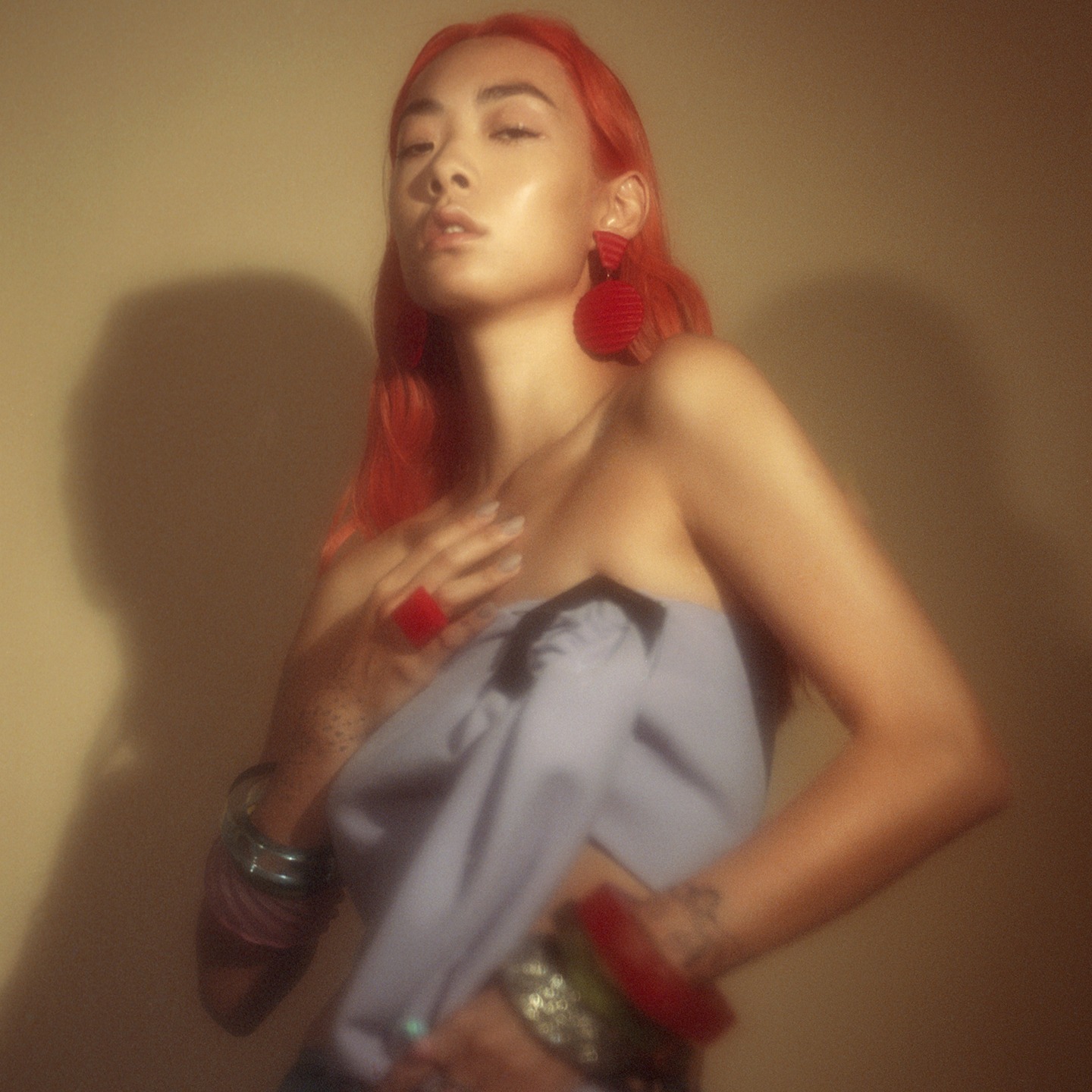 Rina Sawayama
Photo by Elizabeth Gabrielle Lee
Rina Sawayama
Photo by Elizabeth Gabrielle Lee
Growing up in Japan, Rina Sawayama was fascinated by the chameleon-like J-pop innovator, Shiina Ringo. “I remember not actually knowing what she looked like,” the independent London artist says. “She completely morphed into different characters for every video, inspired by jazz, rock, and cyberpunk. She’s one of my biggest influences.”
The eclectic approach stuck. On her fantastic new mini-album, RINA, Sawayama freely draws from Top 40 styles, loosely grounding her music in a millennial melange of springy dance-pop, spiky guitar lines, and strutting R&B. Following up her riff on digital anxiety in this year’s “Cyber Stockholm Syndrome,” the new project’s most compelling moments are when she imbues nostalgic sounds with her response to today’s weird world. The New Jack Swing-inspired “Ordinary Superstar” is a winking commentary on millionaire YouTube vloggers whose brand is being “just like you,” while “Take Me As I Am,” with its Clarence Clarity beat that snaps like a lost Bloodshy & Avant production from 2001, addresses pop music’s lack of Asian representation. “The sonic influences are coming from a place where there were no politics in the music,” says Sawayama of these retro textures. “I wanted to use that tongue-in-cheek sound to convey a message.”
People are listening: she has started to reach fans over the past couple of years through slick music videos, a couple of fashion campaigns, and a consistent determination to call out prejudice online. On a recent phone call, Sawayama talked unselfconsciously about racial inequality in music, the meditative power of video games, and how reconnecting with Japanese pop culture was integral in shaping her new sound.
 Rina Sawayama
Photo by Elizabeth Gabrielle Lee
Rina Sawayama
Photo by Elizabeth Gabrielle Lee
 Rina Sawayama
Photo by Elizabeth Gabrielle Lee
Rina Sawayama
Photo by Elizabeth Gabrielle Lee
Your first release was the dreamy “Sleeping In Waking,” back in 2013. How has your approach to making music changed since then?
I stopped going on SoundCloud and comparing myself [to other artists]. I was young and I didn’t really know myself, so I kept looking at what other people were doing. I struggled for several years, but then I started listening back to what I was really inspired by. I realized that was a lot of Japanese music.
Which Japanese artists were your favorite?
I spent my formative musical years in Japanese school, and back then I was really inspired by this girl band called Morning Musume. If you look at their videos, it’s really psychedelic, and I didn’t feel like they were sexualised in a way that maybe [48-person J-pop group] AKB48 were, or overtly trying to be kawaii, like Kyary [Pamyu Pamyu] is.
I became really obsessed with Utada Hikaru — “Automatic,” and her songwriting in general. She was writing when she was 15 or 16, coming out with these incredible melody lines that were inspired by the West, because she was brought up in New York. Having her as a role model was awesome. She would give interviews and she wouldn’t really have perfect Japanese. It was like, Oh cool, she was brought up in New York, she makes awesome music as well.
But when I went outside of London for three years to go to Uni, it got all a bit confused. I sort of rejected Japanese culture for a while.
You studied at Cambridge University. Why did you put that part of yourself to the side?
I couldn’t put a name to it at the time, but it was definitely the patriarchy. I got there and [saw that] a girl went up to a black guy and was like, “Oh, you’re our replacement black guy.” And she was referring to a student that had graduated. The racism...I’d never been stereotyped in that way, because in London I’d gone to a multi-ethnic school. To survive, genuinely, I tried to lay low, but I ended up getting bullied anyway; I had to move houses because this group of girls decided to bully me.
How did you get through it? It must have been tempting to say “fuck this.”
Oh my god, all the time. When I was there, if you wanted to take a year out of uni and then come back it was called “degrading.” There was a big stigma about not being able to handle [the pressure]. I was extremely scared. At the same time, [I had an] Asian family; I don’t want to stereotype, but they were really happy I was going there. I didn’t wanna let them down. It did really take its toll on my mental health.
 Rina Sawayama
Photo by Elizabeth Gabrielle Lee
Rina Sawayama
Photo by Elizabeth Gabrielle Lee
 Rina Sawayama
Photo by Elizabeth Gabrielle Lee
Rina Sawayama
Photo by Elizabeth Gabrielle Lee
For your mini-album RINA, you worked closely with the producer Clarence Clarity. Do you share a similar taste?
He was also obsessed with [the collaborations between] Britney and Max Martin, and Justin Timberlake and The Neptunes. That R&B/pop crossover, and pop/rock too. Maybe this is a nostalgic lens that I’m looking through, but songwriting back then was much more classical and melodic. I’m taking it back to that era where the songwriting has to be solid, and it has to work acoustically. Nowadays there are some songs that just won’t work if you played them acoustically, ‘cause a lot of it relies on the production and the millennial whoop.
On “Cyber Stockholm Syndrome” you describe an introvert who’s more comfortable staring at their phone than being out in the world. How much of that is based on your own life?
A lot. You can love being around people but also realize that it sucks energy out of you. That particular song was inspired by my friendship with [photographer] Arvida Byström. She creates so much art in a way that explores femininity in a way that involves nudity. [Before I met her] I thought, Oh, people who are like that are just really wild, but she’s so sweet, and we shared an understanding of the social anxiety that we both have. [For “Cyber Stockholm Syndrome”] I imagined someone like her who is liberated by her online presence, but also perhaps at a real party, she would look at her phone and be messaging a friend from Instagram. That’s certainly something that I find myself doing.
You just released a mini-album, but I heard you’re working with A.K. Paul on new music. How’s that gong?
We’ve got an awesome song together but we need to finish it. He’s so busy. I wrote lyrics to it that are a diss on capitalism. I’d gotten fired by Apple — I used to work in retail at the Regent Street store — and I got fired because I did a Samsung advert [laughs].
The mini-album was just for me to set the scene, and the next thing is an album, depending on how things go. I have so many songs, but I don’t want to rush it.
I saw a film of you playing video games. What’s your favorite?
I use playing games as meditation, because you don’t think about anything else. You don’t even care if your phone rings. I really enjoyed this game called Horizon Zero Dawn, which is set in a post-apocalyptic world. It was the first game where I felt that there was a girl who was multi-dimensional. She’s not fetishized, she hasn’t got her tits out. She was very strong, and the whole thing was not based around trying to get this heterosexual relationship at the end. [In most games] it’s always like “she does it for love,” but that wasn’t part of the narrative. It was a bit queer, and that was great.
